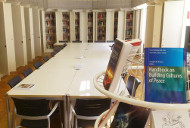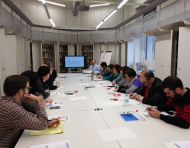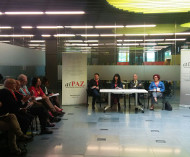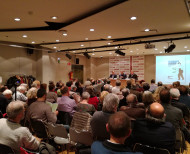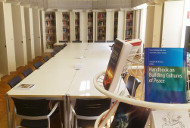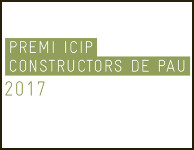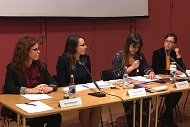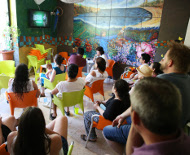The ICIP Library acquired a hundred new publications in April, most of which are available on loan. The Library, specializing in issues of peace culture, security and conflicts, and a benchmark in this field in Catalonia, is located on Carrer Tapineria 10, 1st floor, in Barcelona.
The Library supports ICIP and researchers and experts in the field of peace, and is in permanent contact with similar centers and institutions from around the world. It is part of the network of specialized libraries of the Generalitat and is included in the University Union Catalogue of Catalonia (CCUC).
Consult the library catalogue.
Author: whads
ICIP produces the new exhibition “Món-tanca”
Like every year, ICIP is working to promote the culture of peace in Catalonia and around the world. One of the novelties of 2017 to contribute to the education and awareness of current issues and debates related to peacebuilding and the culture of peace is Món-tanca (“Fence-World”), a new project by the Enmedio Collective, which is currently under production.
The exhibition will reflect on walls and borders and explore ways to subvert the logic of separation and stigmatization. The opening of the exhibition is scheduled for May in Sant Boi de Llobregat and it will be available for organizations and local governments starting in June.
Exhibitions available
ICIP currently has three more exhibitions available to organizations interested in education and awareness in the field of peace culture.
First of all, there is “Living on the Edge,” a photojournalism project by Marco Ansaloni and Angelo Attanasio on conflict and reconciliation in divided cities in Europe. This is a photographic exhibition and audiovisual presentation of a journalism project carried out in Belfast (Northern Ireland), Mitrovica (Kosovo), Mostar (Bosnia and Herzegovina) and Nicosia (Cyprus). The project shows how conflicts that have divided the residents of these cities are intertwined with the stories of people who work to overcome the past and define a common future.
Secondly, “#efecteGEZI: The Transformative Power of Art” shows the power of collective imagination when used in favor of nonviolent social transformation based on the story of what happened in Istanbul in 2013. It consists of a photographic exhibition that illustrates how people of diverse origins, cultures, lifestyles and beliefs, such as those who gathered in Gezi Park, can set aside their differences and join forces to protest nonviolently against a situation they considered to be unfair.
Finally, “Barefoot Words: Women Making Peace,” by photographer Dani Lagartofernández, is also available. This is a collection of portraits of thirteen women who are actively working to achieve peace in the Middle East. They are Israeli and Palestinian women who dedicate their lives and efforts to achieve an end to the conflict and respect for human rights. All of them are barefoot, a metaphor for their honest and direct stance regarding the reality they have been forced to live in.
ICIP presents the process of thematic focus
ICIP has opened a round of meetings with various stakeholders in order to present the process of reflection and thematic focus initiated by the new Governing Board, led by Xavier Masllorens.
Thus, on 23 January, ICIP held a meeting at its offices with MPs from the various parliamentary groups of Parliament’s Commission on Foreign Affairs and Cooperation (CAECRIT), experts from the Catalan Council for the Promotion of Peace, and members of universities and the academic world. Also in January, the president of ICIP presented the process of thematic focus to Lafede.cat – Organizations for Global Justice and to the NGDO Coordination Group and other solidarity movements in Lleida. On Wednesday 8 February, Xavier Masllorens will also meet with the Solidarity NGO Coordination Group in Girona.
ICIP condemns the arrest warrant against the presidents of ANC and Òmnium Cultural
ICIP (International Catalan Institute for Peace) firmly condemns the arrest warrant, issued against the presidents of ANC and Òmnium Cultural, Jordi Sánchez and Jordi Cuixart, for their calls for peaceful protest and for having exercised their right to freedom of speech. As an institution for the defence and pursuit of peace, human rights and conflict resolution, we can only consider that politically and ideologically motivated arrests are inconceivable.
The arrest warrants without bail, issued by the Audiencia Nacional (Spanish national high court), constitute a serious political error and demonstrate how politics has failed to resolve the political conflict between Catalonia and Spain.
This measure demonstrates the breakdown of the rule of law, where separation of powers should be a fundamental principle. We understand that the Spanish government is determined in using these two arrests to leave actions, which should be taken on the political level, in the hands of the courts. We want to make clear that legal power should not become an instrument of political power.
Likewise, this action boosts social tensions rather than lowering them, which would have been the appropriate attitude to take by the public powers.
We also want to make clear that the Spanish government’s constant denial of the political conflict Catalonia is going through makes it impossible to find mechanisms to resolve it, as there are the requested international mediation and solution through dialogue.
Finally, within this context, once more we call upon the citizens of Catalonia to keep defending their ideas, using the values on nonviolence and peaceful resistance, as they have been doing lately during the massive pacific and civic protest rallies.
Call for text reviewers
In the framework of thematic focalisation process, ICIP has decided to launch a call, in order to set up a team of reviewers that will allow an anonymous and rigorous review of texts, eligible for publication by the Institute. This is done with the objective of reinforcing the research promotion and publication capacity.
The selection of the candidate reviewers will be done by ICIP’s Publication Commission through an assessment of the applications presented regarding the candidates’ level of expertise and knowledge in topics of interest for ICIP, with the objective of guaranteeing that the review process complies with the standards of quality and accuracy the academic publications need to meet. Text evaluation tasks will be rewarded with a financial remuneration in agreement with ICIP’s salary grid.
The persons interested in presenting their application for this call need to fill out the inscription form and send it, together with their CV, to the following email address: recerca.icip@gencat.cat
The Forum on Urban Violence in Madrid ends with a Decalogue of commitments
The World Forum on Urban Violence and Education for Coexistence and Peace, which took place in Madrid on 19, 20 and 21 April, has concluded with an institutional declaration containing ten commitments for the building of Cities of Peace. The declaration establishes the creation of an International Technical Secretariat to ensure the continuity of the forum in the future and the intention of creating a Local Agenda on Urban Violence and Education within two years.
The Forum brought together 3,500 participants from 70 different countries, a hundred mayors and numerous international organizations to discuss and reflect on the challenges facing cities to prevent and combat the many faces of violence. The final document, adopted by participating local governments and civil society organizations, urges state governments to create and supervise action plans for the prevention of violence, introduce anti-corruption mechanisms, develop local action plans against violence, promote policies of equity and inclusion, and encourage coexistence and mediation.
As a member of the Spanish Association for Peace Research (AIPAZ), ICIP was part of the organizing committee of the Forum and actively participated in the conference, which provided a meeting point for the exchange of knowledge among similar institutions. The ICIP delegation present at the Forum was headed by the Institute’s president, Xavier Masllorens, and its director, Tica Font.
New Series of Interviews to Recover the Historical Memory of the Peace Movement
Over the past few months, with the aim of tracing the history of the peace movement in Catalonia and safeguarding its collection of documents, ICIP has been carrying out an oral history project of the collective action for peace based on the recording of interviews with its protagonists.
During the first months of 2017, activists Gabriela Serra and Arcadi Oliveres, philosopher and professor Fèlix Martí, artist and politician Jaume Rodri, and the former secretary of Justícia i Pau, Paquita Conejero, shared their testimonies.
In May and June the series will expand with interviews with the founder and former director of the School of Culture of Peace, Vicenç Fisas, politician Àngel Colom, activist Martí Olivella and the episcopal delegate for Justícia i Pau, Josep Maria Fisa.
This oral history project is being implemented with the collaboration of the Metromuster production company. The interviews are being conducted by Xavier Garí, a specialist in the political and social history of the Peace Movement in Catalonia, and they will be released on video in the course of this year for the use of researchers and historians.
Human security, an alternative to armed security
The book Building a Safe and Peaceful State: How to Approach Security and Defense in a New European State, by the State of Peace Seminar group, was publicly launched on Thursday 23 February, in an event at the Palau Robert in Barcelona, with the participation of ICIP president Xavier Masllorens, Minister of Foreign Affairs, Institutional Relations and Transparency, Raül Romeva, and one of the members of the State of Peace Seminar and author of the book, Martí Olivella.
The book, published by ICIP as part of the “Tools of Peace, Security and Justice” series, is a compilation of reflections made over the course of three years by a group of people from various organizations working in the field of peace. This group argues that states should deal with conflicts from a nonmilitary perspective and abandon defense as a traditional pillar of security. Thus, the authors indicate that there is an alternative to armed security, which is human security. In the words of Xavier Masllorens, this debate is the result of a triple ascertainment: “The most armed peoples of the last thirty centuries have never been the most secure; a conflict has never been permanently resolved through the use of arms; and the pursuit of maximum security leads to maximum insecurity.”
For his part, Martí Olivella argued that “we need a more effective and intelligent security system” and he added that the nonmilitary perspective is an ethical option “because we do not accept violence as a way to resolve conflicts” and a strategic one “to take precautions and to avoid perpetuating conflict.”
Finally, Minister Romeva suggested “putting new ideas on the table, without fear or prejudice” and noted that “the constitutional process will allow us to discuss security and defense without imposed taboos.” The Minister also added that “we have an obligation to state that the traditional way of resolving conflicts has not worked. We must search for, think about and imagine ways and structures that allow us to see beyond traditional security.”
The event was attended by about 120 people, including members of the ICIP Governing Board, like Manel Vila and David Minoves; State of Peace Seminar participants, like Pepe Beunza, Antoni Soler and Jordi Armadans; the ex-president of Parliament, Joan Rigol; former minister Joan Manuel Tresserras; and singer Núria Feliu.
New items at the ICIP Library
The ICIP Library acquired a hundred new publications in June, most of which are available on loan. The Library, specializing in issues of peace culture, security and conflicts, and a benchmark in this field in Catalonia, is located on Carrer Tapineria 10, 1st floor, in Barcelona.
The Library supports ICIP and researchers and experts in the field of peace, and is in permanent contact with similar centers and institutions from around the world. It is part of the network of specialized libraries of the Generalitat and is included in the University Union Catalogue of Catalonia (CCUC).
Consult the library catalogue.
ICIP Award, Pending Resolution
The deadline for submitting nominations for the 2017 ICIP Peace in Progress Award was Thursday 6 July. The ICIP Governing Board –in charge of granting the award– will study the submitted nominations and announce the winner on 21 September, the International Day of Peace. As in the past, an awards ceremony, which is open to the public, will be held sometime in the following months.
The ICIP Peace in Progress Award is granted by agreement of the Governing Board of ICIP and consists of public recognition, a sculpture created by the Nobel Peace Prize winner, artist and activist Adolfo Pérez Esquivel, called Porta del Sol, and a financial prize of 4,000 euros. The award is presented at an institutional award ceremony which takes place annually at the Catalan Parliament.
Previously granted
The first edition of the award in 2011 recognized the struggle of conscientious objectors and “insubmisos” (people who refuse to do military service or any substitute social work) represented by Pepe Beúnza, the first conscientious objector to compulsory military service for ideological reasons in Spain. The same year, in an extraordinary edition of the award, the Parliament of Catalonia was honored for representing the continuity and legacy of the institutions “Pau i Treva” and “Consolat de Mar.”
Then, in 2012, the ICIP Award was granted to five Madres de Soacha (Mothers of Soacha) for their work in favor of peace and human rights in Colombia. The next year the award was granted to the ex-general born in Belgrade, Jovan Divjak, for his courage in the defense of Sarajevo during the Balkans War and his work in favor of the victims of that conflict.
In 2014, honored the Women’s International League for Peace and Freedom (WILPF) for its century-long involvement in the work of women for peace, while in 2015 was granted to the Capuchin friar Joan Botam, promoter of numerous initiatives linked to peace and ecumenism.
In the last edition of the award, in 2016, the ICIP Peace in Progress Award recognized the work carried out by Peace Brigades International in the support and accompaniment of human rights defenders.
Annual meeting of the Network on Business, Conflict and Human Rights in Geneva
Last 30th November, more than 40 experts attended the annual meeting of the International Research Network for Business, Conflicts and Human Rights (BCHR Network) in Geneva, chaired by ICIP and formally constituted two years ago. The objective of the meeting was to debate with staff members from universities, research centres and NGOs on a wide variety of matters, related with the role of business in contexts of armed or heavy social conflict.
The meeting started with a talk by Mary Martin (LSE) on human safety as a new approach for business and peacebuilding. Next, Gina Menghini (ICoCa) and Eddy Stam (UNI Global Union) talked about the need to strengthen access mechanisms for solutions in the defence against violations of rights by private security industries. Heather Cohen (ICAR), Núria Reguart (Jaume I University) and Claudia Rojas (Universidad Externado, Colombia) highlighted the latest novelties in the area of conflicts and land rights.
The second part of the session, coordinated by Amol Mehra (ICAR), consisted of a brainstorm and an open discussion between all the participants on business and human rights in occupied territories. In this space, lawyer Emily Schaeffer Omer-Man presented the main achievements and challenges with respect to legal action against human rights violations the occupied Palestinian territories.
The last conference addressed the latest progress in matters of transparency and involvement; Brian Wood (Middlesex University) presented the legal case of weapons export from the United Kingdom to Saudi Arabia with regard to their use in Yemen. Also, Bruce Broomhall (University of Quebec) spoke about how to adopt habits of responsible procurement in supply chains related to the trade of minerals from conflict areas.
To finish the session, the Network held its General Assembly, where the perspective of conflicts with respect to the development of a Binding Treaty of the United Nations for transnational and other companies in matters of the respect for human rights was reinforced. The assembly also underlined the need to talk about human rights defenders. Some participants brought up the importance of exploring how the network could actively participate in the United Nations Forum on Business and Human Rights.
Finally, it was decided to organise the next meeting in 2018, after the closing session of the UN Forum, since this format simplifies the participation and attendance of a large number of persons from different countries with a wide diversity of professional profiles and personal motivations.
L’ICIP acompanya la Caravana de Dones per la Memòria a Barruera, a la Vall de Boí
La Caravana de Dones per la Memòria va viatjar el cap de setmana del 17 i 18 de juny fins a Barruera, a la Vall de Boí, per prendre testimoni de l’Ana Isabel, dona colombiana que fa 15 anys que viu a Catalunya. La documentació de testimonis de dones colombianes a l’exterior es desenvolupa dins de la iniciativa de la Comissió de la Veritat, Memòria i Reconciliació de les Dones de la Diàspora Colombiana.
Aquestes accions tenen lloc en el marc del projecte “Estratègies de memòria, veritat i reconciliació de dones colombianes a l’exterior”, que l’ICIP desenvolupa amb el suport de l’Ajuntament de Barcelona. Aquest projecte esdevé una aposta per contribuir, amb diferents metodologies innovadores, a la construcció de pau a Colòmbia des de Catalunya. El projecte engloba una sèrie d’iniciatives que tenen com a objectiu afavorir un escenari de reconciliació tot apoderant les dones que hi participen a través d’estratègies de treball de la memòria i de la construcció de pau.
En el marc del mateix projecte, l’ICIP està desenvolupant l’acció Cuerpos Gramaticales, que culminarà la tardor vinent amb una performance a Barcelona.

